Are you thinking about starting your own summer camp, but you’re not really sure where to start?
Well, just like with any other business, there’s a considerable amount of paperwork involved. However, fear not, because we’re here to help!
In this article, we’ll cover the paperwork needed to start a summer camp.
This includes the documentation you as a business owner need to fill out and submit, as well as the forms you need to ask the parents and staffers to submit to you.
Let’s start with business entity documentation.
- Business Entity Documentation
- Tax Paperwork
- Permit and Licensing Documentation
- Business Insurance Paperwork
- Staff and Volunteer Documentation
- Registration Forms
- Camper Medical Documentation
- Parental Consent Forms
- Travel and Transportation Paperwork
- Waiver and Release of Liability Forms
- Conclusion
Business Entity Documentation
Starting a summer camp is super exciting and rewarding, but it also requires thorough planning and a lot of well-informed decision-making.
One of the first decisions you’ll have the make is the type of business entity you’re going to register with the state. There are four most common types to choose from:
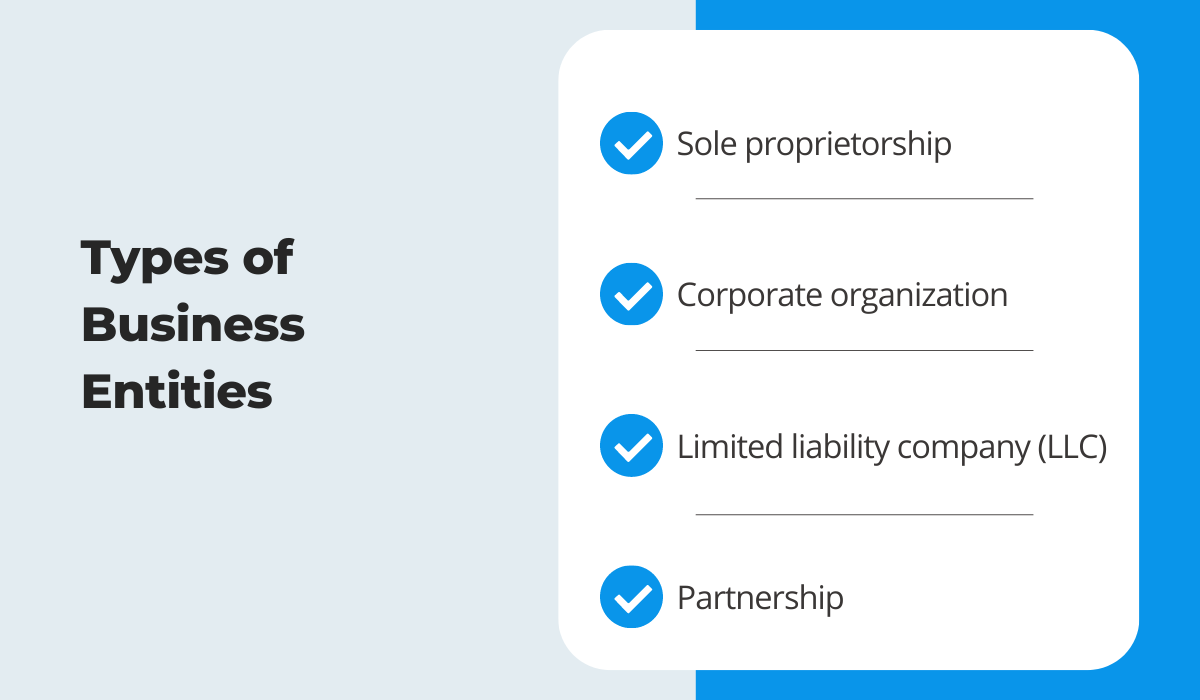
Data: FounderzJRNY/Illustration: Regpack
Make sure to consider your liability exposure and goals for your camp because these are the factors that’ll determine which type is the most suitable for you.
For example, an informal and unincorporated business structure, such as a sole proprietorship, is one that is inexpensive to form and maintain.
However, do keep in mind that, as a sole proprietor, you’re personally liable for all the legal issues that may arise, meaning you risk losing both your business and personal assets.
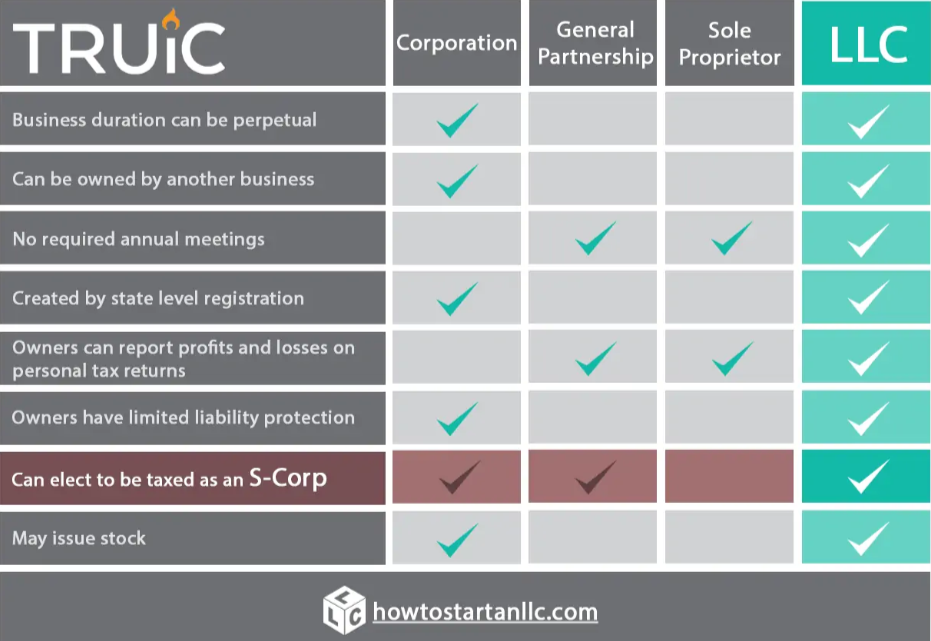
Source: TRUiC
Therefore, sole proprietorship is a better choice for low-risk/low-profit businesses with a smaller customer base, while other types, such as LLC, offer more flexibility and liability protection.
Once you choose the option that makes the most sense for you, you need to register it with the state in which you’ll be conducting business.
You’ll be provided with all the necessary paperwork for the registration by the state’s Secretary of State office.
Don’t forget to do your due diligence and research all the financial and legal requirements for your business entity.
More importantly, don’t shy away from asking for help from professionals if you have any concerns.
There are many registered agents across each state ready to help you with the process.
Tax Paperwork
The next step would be to register for different state and federal taxes.
However, before you can do that, you’ll probably need to apply for an Employer Identification Number (EIN). This is like a security number for your business.
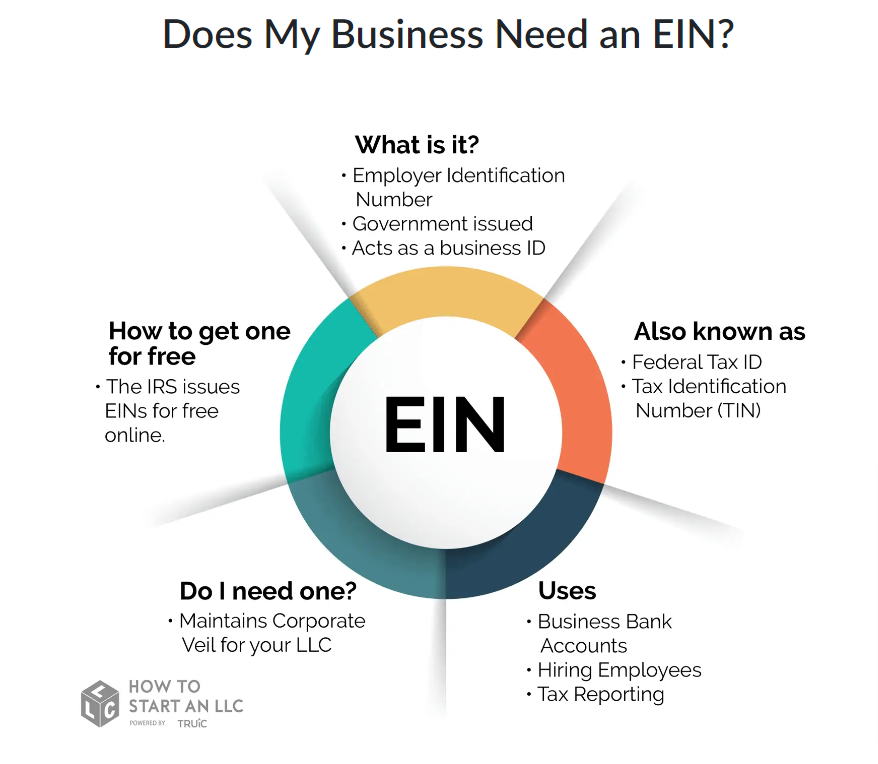
Source: TRUiC
You apply for an EIN for free with the IRS, but there are specific rules which determine whether or not you need to apply.
Therefore, if any of the following statements pertain to you, you’ll need an EIN:
- Your summer camp has employees.
- Your summer camp is a partnership or corporation.
- Your summer camp files excise taxes.
- Your summer camp withholds taxes for nonwage income paid to nonresident alien.
To apply for an EIN, you need to fill out the SS-4 form and send it in via fax or email.
You can find more details about it here. It’s also possible to apply online on the IRS website using the EIN assistant.

Source: TRUiC
Keep in mind there are a variety of different state taxes that might be applicable to your business. Do consult the state sales tax guide to see if any apply to you.
For example, if you plan on selling any taxable items in your camp, you’ll probably need a Sales Tax Permit.
Doing proper research now, no matter how time-consuming it might seem at the moment, will save you time and money in the long run and set your business up for success.
Permit and Licensing Documentation
Permit and licensing documentation is quite important because, without it, you could face fines, penalties, various legal issues, or even have your camp shut down.
Naturally, licensing requirements vary on both federal and state levels, so make sure to check out SBA’s guide to federal and state licenses. It’s a great starting point.
However, you should also consult your state’s website as well as the town, city, and county clerk’s office because local regulatory requirements may apply to you.
The fact is, the majority of states have specific regulations for businesses that work with children and require some level of government supervision from different agencies, such as, for example, the Department of Children and Family Services (DCFS) or the Department of Public Health.
Fortunately, on their website, the American Camp Association (ACA) provides a list of required licenses and laws for each state, so you can find out which licenses, background checks, pay requirements, etc., you need to comply with.
For example, according to State regulations of New York, you must have “a state, city or county health department permit to operate legally.“
Below, you can see a portion of the requirements for obtaining that permit.

Source: NY State Department of Health
Do bear in mind, though, that obtaining these approvals can take up to a year sometimes, and the permits need to be periodically renewed, so plan accordingly.
Business Insurance Paperwork
Insurance is another thing that contributes to safe and lawful business operations, and it covers potential liabilities.
For example, an insurance policy can include liability coverage for injuries that might occur at your camp or for medical expenses that may come up.
And although these things are not pleasant to think about, the fact remains you need to be prepared for anything.
But what kind of insurance do you actually need?
There are many types of insurance policies made for different businesses and different risks involved.
These are the most common insurance policies:
- General Liability Insurance
- Commercial Property Insurance
- Inland Marine Insurance
- Cyber Liability Insurance
- Business Interruption Insurance
- Workers Compensation
If you’re not quite sure which one’s the right fit for you, consider starting out with General Liability Insurance.
Here’s what it covers:
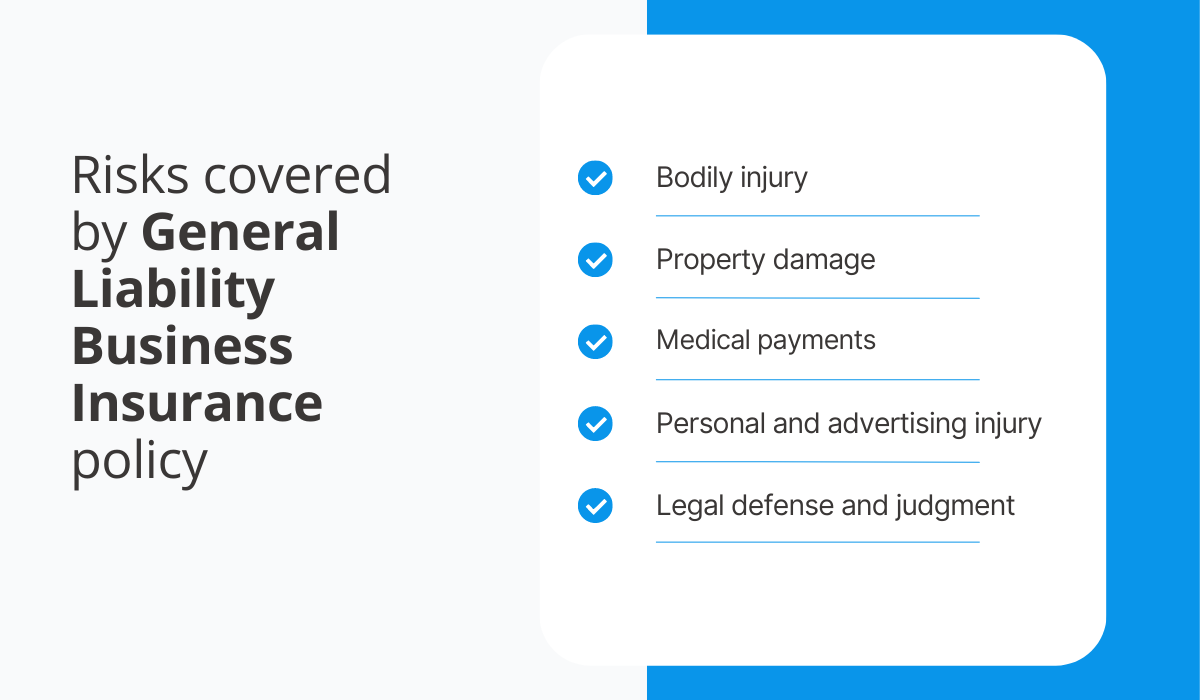
Data: TRUiC/Illustration: Regpack
This type of insurance is a popular choice for many small business owners, precisely because it protects you from most claims small businesses face.
On top of that, it’s usually fairly inexpensive.
All in all, insurance falls under those things you don’t need all the time, but when you need it, your really DO need it. So make sure you’ve done thorough enough research.
Staff and Volunteer Documentation
Your team plays a major role in your camp’s success. Therefore, you need to make sure you have the right people for the job.
The most effective way to find the best staff is via thorough job application forms. They’ll help you find the most qualified team members quickly and easily.
Provided you ask the right questions, of course.
Naturally, you want to begin with more basic questions, such as first and last name, date of birth, contact information, etc.
Take a look at the example below:
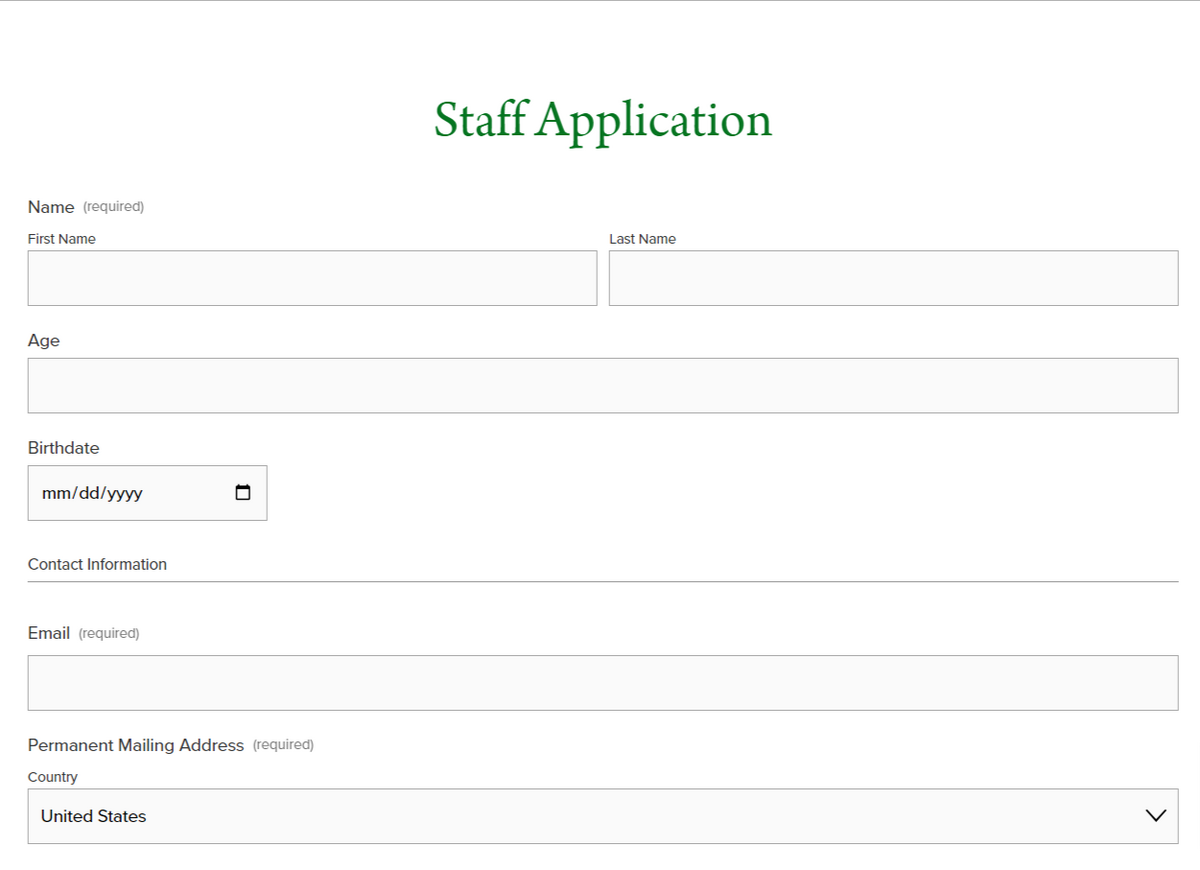
Source: The Summer Camp
After you’ve covered the basics, you can move on to more in-depth questions about work experience and history, where you leave room for candidates to elaborate on what their duties were at their previous jobs, how that experience applies to this position, or what they bring to the table in general.
For instance, in their staff application form, Camp Suisse provides a list of special skills or interests with checkboxes that applicants can tick.
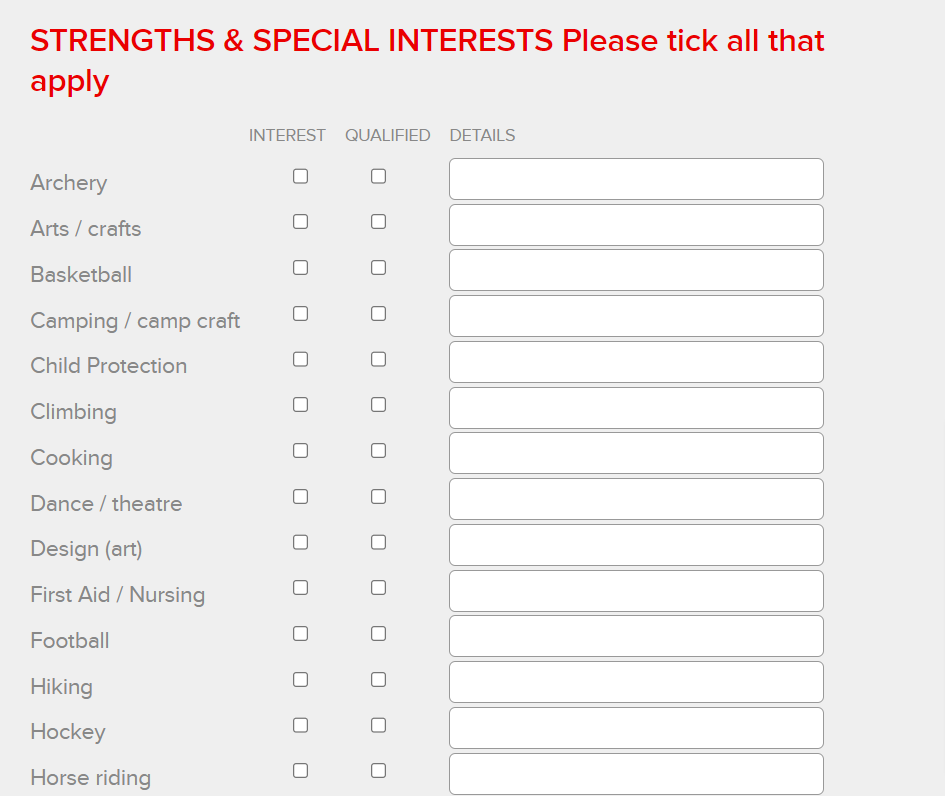
Source: International Camp Suisse
This is a great addition to an application form because it’s easy for applicants to fill out and for the recruitment team to review.
Keep in mind that every camp is different and has different staff needs, so make sure you don’t just copy other camps’ job application forms.
Instead, take the time to think about what you’re looking for in camp staff members and tailor the form to your own needs.
Registration Forms
Registration forms are really important for leaving that good first impression on the parents and creating the sense of a well-organized camp.
That’s why you want the registration process to be as seamless as possible.
The best solution for those that want a smoother registration process is camp registration software that allows you to create your own online registration forms.
After all, online registration forms trump paper forms every time. Here’s why.
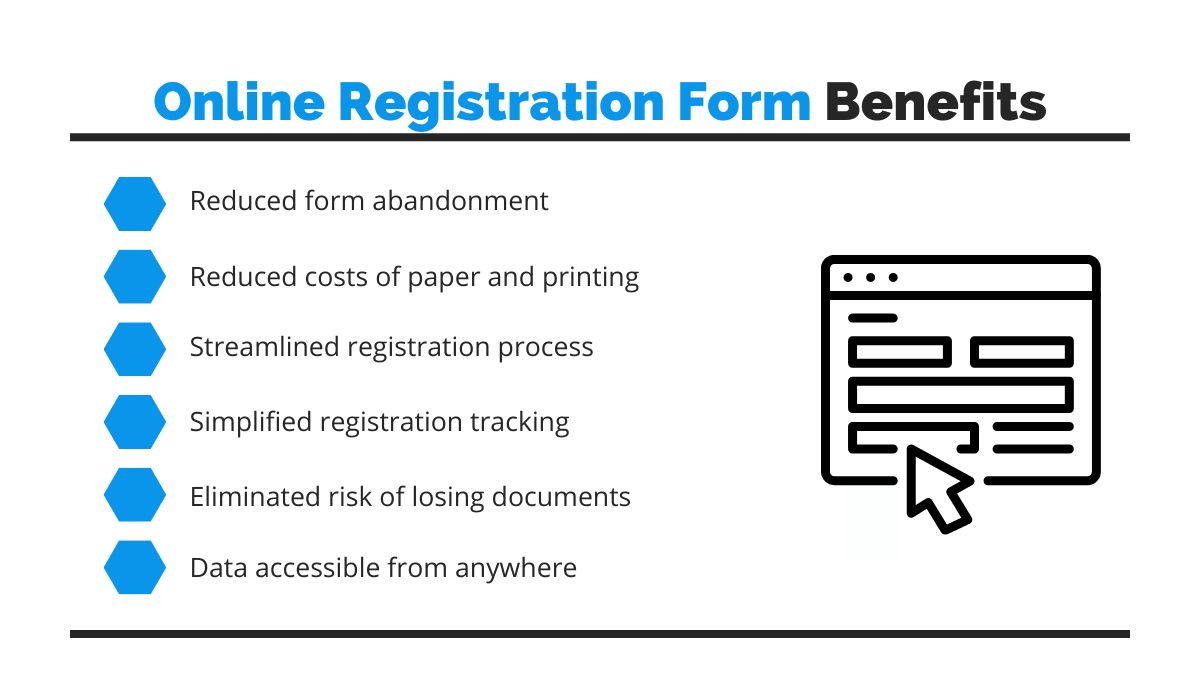
Source: Regpack
Online form builders like Regpack’s are a great solution because they are simultaneously easy to use and flexible, as they enable you to ask whatever you want, in any form you want.
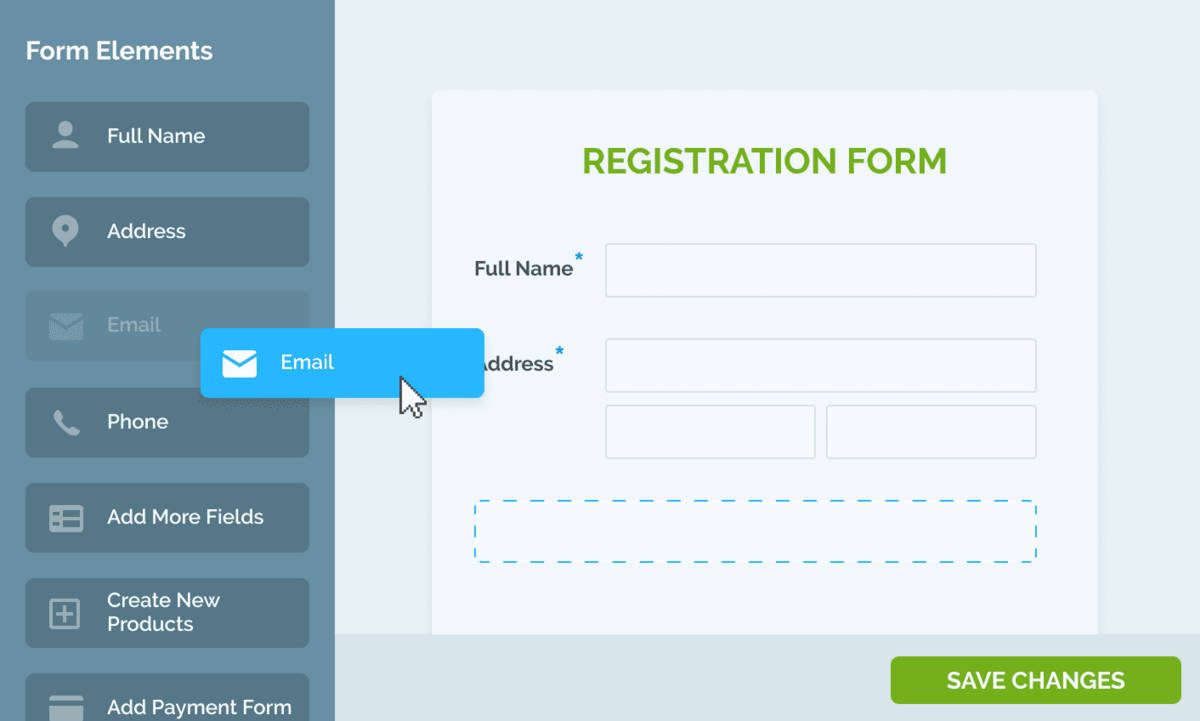
Source: Regpack
Regpack’s form builder lets you customize your forms by dragging and dropping the elements you need.
Once you’re done building your registration form, you can embed it on your website with just one line of code, making the process even more streamlined.
The parents will appreciate the intuitiveness of the whole process, and they’ll be more likely to actually finish that registration.
Camper Medical Documentation
Sure, camps are fun, but you need to be prepared, at all times, for different situations that might arise – even those that are less than fun.
This is where the campers’ medical documentation comes in. It’s advisable to send the documentation to parents to fill out before camp starts.
That way, should something happen during camp, you’ll be prepared and have all the relevant information at hand.
For starters, make sure campers’ information, as well as emergency contacts, are included in the form.
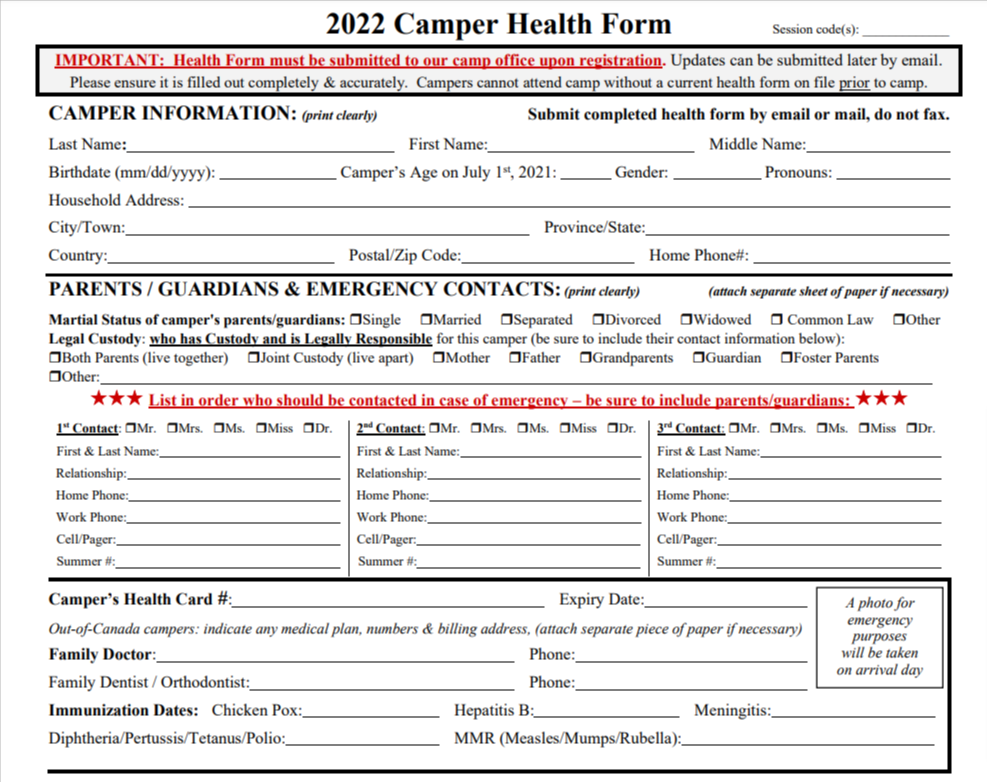
Source: Camp Kawartha
Also, inquire about the camper’s medical history so you and your staff can make informed decisions at any given moment.
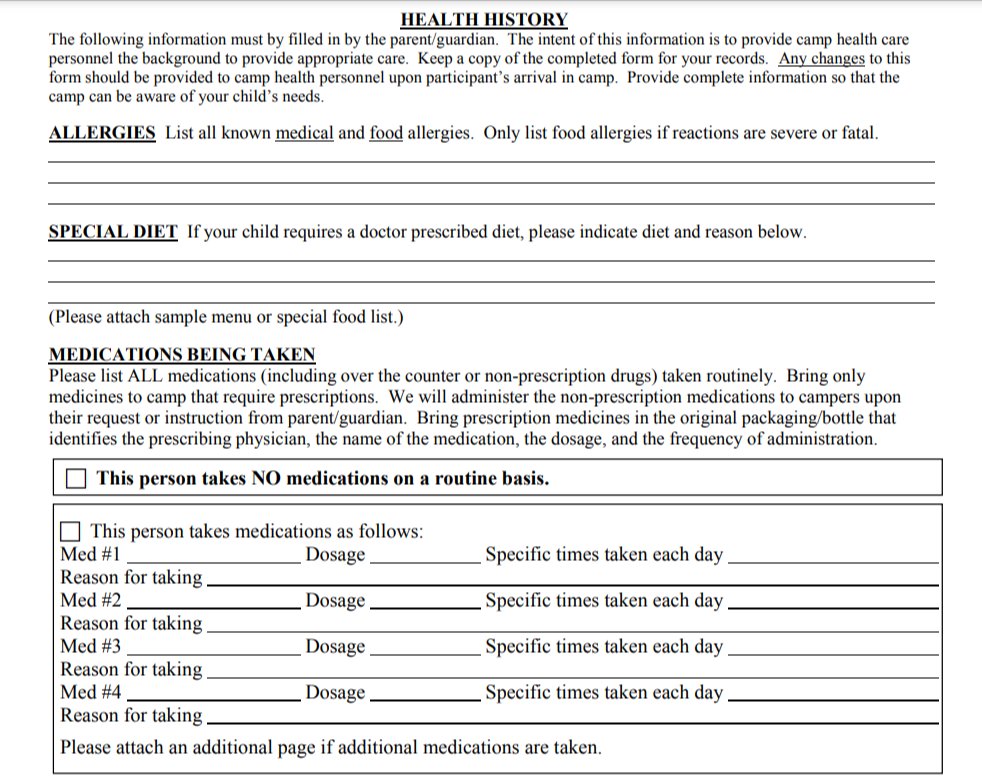
Source: Camp Willow Run
Make sure you ask about allergies or special dietary restrictions.
If a child takes medication on a regular basis, a parent should state which medication this is, when it needs to be taken, the dosage, and the reason for taking it.
All in all, make sure you cover as many bases as possible with these forms. With summer camps, it’s not likely something bad will happen, but if it does, you certainly need to be ready.
Parental Consent Forms
You can also combine the medical forms with parental consent forms. These can be either for your camp in general or for specific days trips or activities you have planned.
Parental consent forms are important because they serve as evidence that a parent knows about these activities and consents to their child partaking in them.
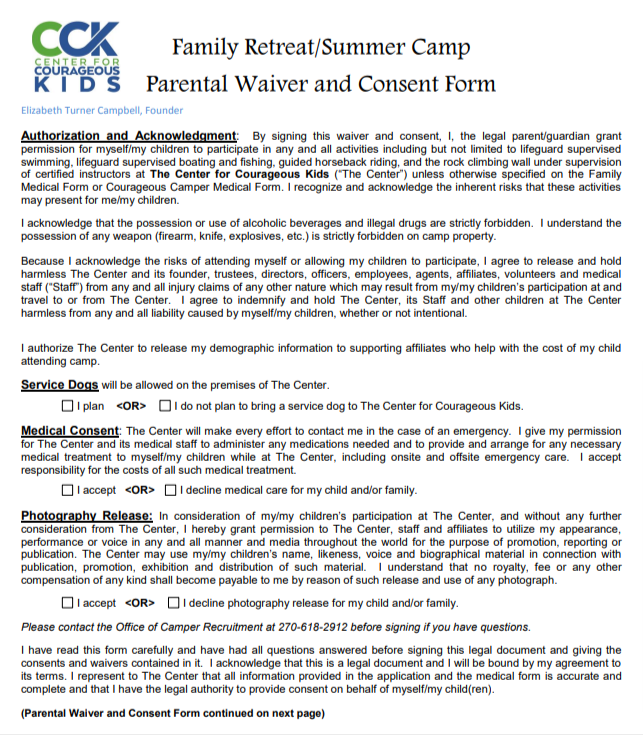
Source: CCK
Moreover, if you plan on taking photos of campers and posting them on your website, make sure you ask permission for that as well.
Some camps even include their statements of commitment to campers’ well-being, safety, and health.
In the image below, you can see a portion of Surrey Christian School’s Parent Consent Letter in which they inserted their Statement of Commitment to Safety.
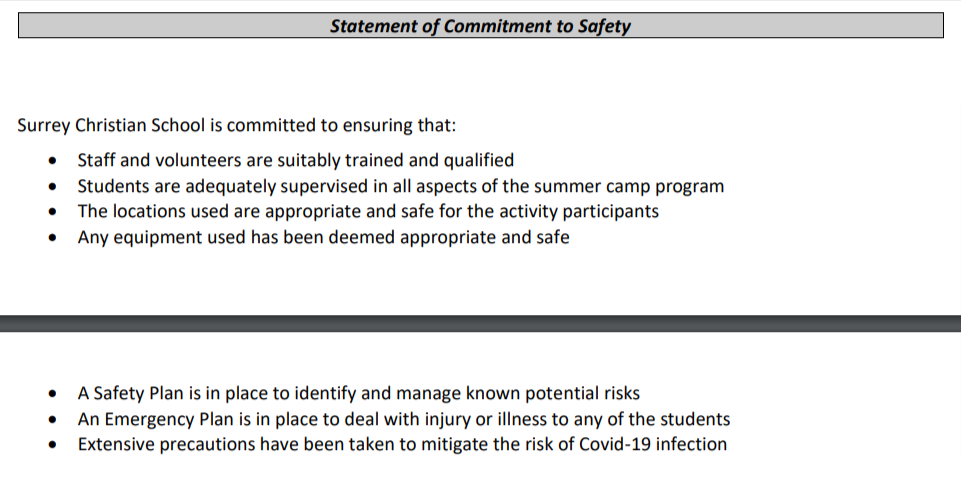
Source: Surrey Christian School
Overall, you want to make sure you have all the consent forms before the camp begins, especially if you have a lot of trips and activities planned.
After all, missing that zip line course can ruin a kid’s whole summer.
Travel and Transportation Paperwork
Although minors in the U.S. are allowed to leave the country without parental permission, exit and entry strategies may vary in other countries.
So, depending on where your camp is located, it can make things go smoother if a child has some kind of travel consent form with them.
The PDF file of Minor Travel Consent Forms can be found on the U.S. Passport Service Guide website.
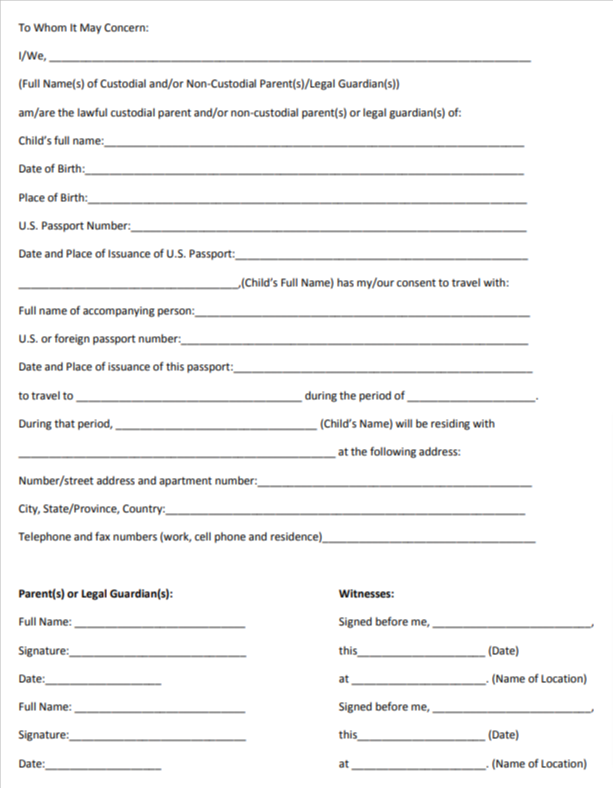
Source: U.S. Passport Service Guide
However, even if there’s no need for international travel consent forms, you can still rely on travel forms to better organize your camp.
To elaborate, if your campers are arriving from different states and you’re charged with coordinating the transportation, you can rely on travel forms to find out each camper’s arrival time and whether they need transportation or if they’ll be arriving directly at the camp.
With this information, you can plan and coordinate pick-up locations and times instead of driving out multiple times in the day to pick everyone up.
Waiver and Release of Liability Forms
Before excited campers start pouring into your camp, make sure their parents have also signed waiver and release of liability forms.
With these, they, in a way, give up their right to sue you, either on their or others’ behalf.
What’s more, release forms tend to be more effective if they are part of a larger document called the participant agreement.
There are many elements of this document, each with its own purpose, but in essence, it’s crucial to state the nature of the agreement, name the parties to the agreement, and explain what risks are involved.
Then, the parents are asked to accept the risks and release the camp and associated persons from future claims.
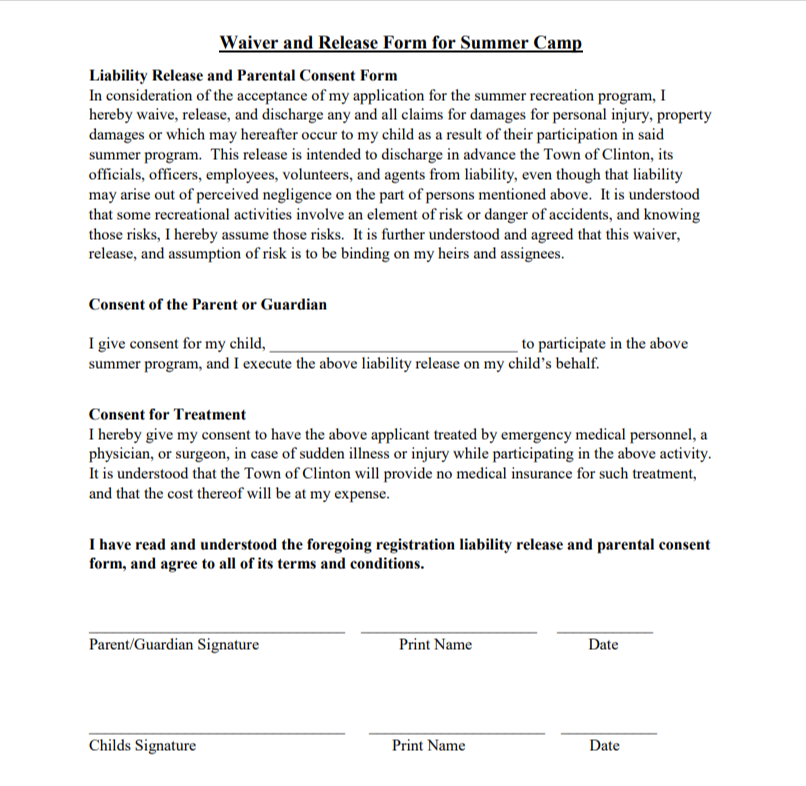
Source: Town of Clinton
Finally, the document needs to be signed by a parent (preferably both parents) or a guardian. In some cases, minors of a certain age are also asked to sign the document.
Another helpful tip here is to try and avoid copying and pasting the forms from other camps.
After all, each camp is differently organized, and the laws vary from state to state, so it’s definitely a safer choice to create your own release form with the help of your legal counsel.
Conclusion
In conclusion, starting a summer camp can appear daunting at first, especially with all the paperwork that seems to have no end.
Don’t get discouraged, though, and keep your eyes on the prize. After all, all these documents are here for your own protection.
So take the time to do this part right, and your camp will surely grow and prosper.


















